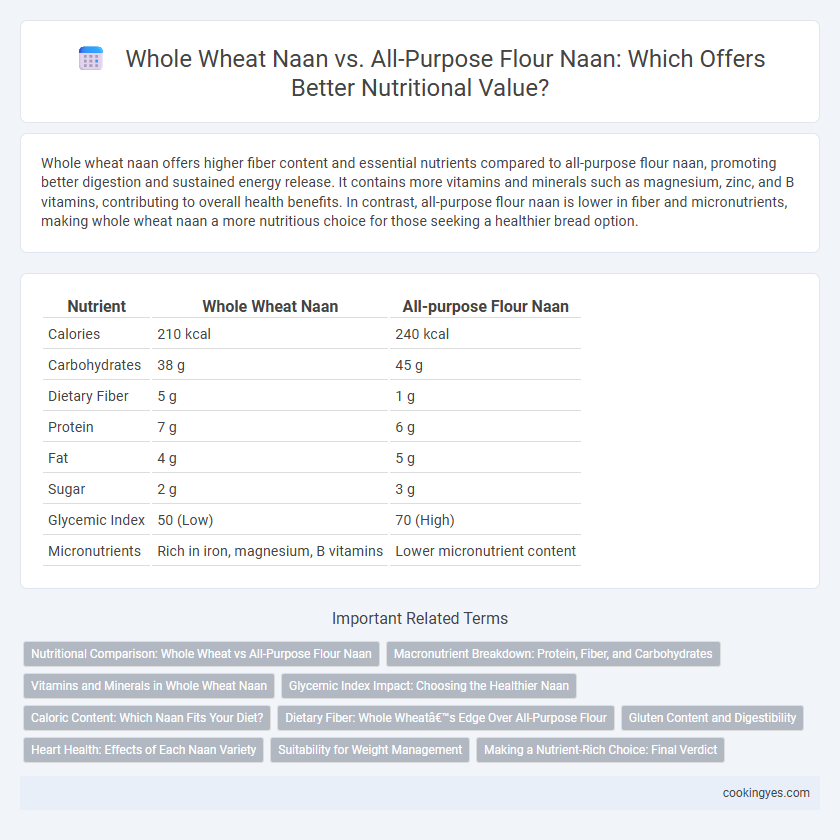Whole wheat naan offers higher fiber content and essential nutrients compared to all-purpose flour naan, promoting better digestion and sustained energy release. It contains more vitamins and minerals such as magnesium, zinc, and B vitamins, contributing to overall health benefits. In contrast, all-purpose flour naan is lower in fiber and micronutrients, making whole wheat naan a more nutritious choice for those seeking a healthier bread option.
Table of Comparison
| Nutrient | Whole Wheat Naan | All-purpose Flour Naan |
|---|---|---|
| Calories | 210 kcal | 240 kcal |
| Carbohydrates | 38 g | 45 g |
| Dietary Fiber | 5 g | 1 g |
| Protein | 7 g | 6 g |
| Fat | 4 g | 5 g |
| Sugar | 2 g | 3 g |
| Glycemic Index | 50 (Low) | 70 (High) |
| Micronutrients | Rich in iron, magnesium, B vitamins | Lower micronutrient content |
Nutritional Comparison: Whole Wheat vs All-Purpose Flour Naan
Whole wheat naan contains higher fiber content, essential vitamins, and minerals such as iron and magnesium compared to all-purpose flour naan, which is primarily composed of refined carbohydrates and lacks micronutrients. The glycemic index of whole wheat naan is lower, contributing to better blood sugar regulation and prolonged energy release. Calorie-wise, both types are similar, but whole wheat naan supports digestive health and satiety more effectively.
Macronutrient Breakdown: Protein, Fiber, and Carbohydrates
Whole wheat naan contains higher dietary fiber, typically 3 to 4 grams per serving, compared to all-purpose flour naan, which usually has less than 1 gram, enhancing digestive health and satiety. Protein content in whole wheat naan averages around 5 to 6 grams per piece, slightly higher than all-purpose flour naan, which provides about 4 to 5 grams, supporting muscle maintenance and repair. Carbohydrate levels are similar, ranging from 30 to 40 grams per serving, but whole wheat naan offers a lower glycemic index, aiding in better blood sugar regulation.
Vitamins and Minerals in Whole Wheat Naan
Whole wheat naan contains higher levels of essential vitamins and minerals compared to all-purpose flour naan, including B vitamins like thiamine, riboflavin, and niacin, which support energy metabolism. The whole grain retains minerals such as iron, magnesium, and zinc, crucial for oxygen transport, nerve function, and immune health. This nutrient density makes whole wheat naan a more nutritious choice for maintaining balanced mineral and vitamin intake.
Glycemic Index Impact: Choosing the Healthier Naan
Whole wheat naan contains more fiber and nutrients than all-purpose flour naan, resulting in a lower glycemic index that helps regulate blood sugar levels. The complex carbohydrates in whole wheat slow glucose absorption, making it a better option for those managing diabetes or seeking sustained energy. In contrast, all-purpose flour naan causes quicker blood sugar spikes due to its higher glycemic index and refined carbohydrate content.
Caloric Content: Which Naan Fits Your Diet?
Whole wheat naan contains more fiber and essential nutrients than all-purpose flour naan, making it a healthier choice for those seeking better digestion and sustained energy. Caloric content varies slightly, with whole wheat naan generally having fewer calories due to its higher fiber content, which promotes satiety. Choosing whole wheat naan supports a balanced diet by offering lower calories and enhanced nutritional value compared to all-purpose flour naan.
Dietary Fiber: Whole Wheat’s Edge Over All-Purpose Flour
Whole wheat naan provides significantly higher dietary fiber content compared to all-purpose flour naan, which aids in digestion and promotes gut health. The bran and germ retained in whole wheat flour contribute essential nutrients and improve blood sugar regulation. Choosing whole wheat naan over all-purpose flour naan supports better cardiovascular health and sustained energy levels due to its complex carbohydrate profile.
Gluten Content and Digestibility
Whole wheat naan contains higher fiber and nutrients due to the bran and germ, enhancing digestibility and providing a slower glucose release compared to all-purpose flour naan. All-purpose flour naan typically has a higher gluten content, resulting in a chewier texture but may cause digestive discomfort for individuals sensitive to gluten. Choosing whole wheat naan can support better gut health and stable blood sugar levels while offering a more balanced nutritional profile.
Heart Health: Effects of Each Naan Variety
Whole Wheat Naan contains higher dietary fiber and essential nutrients like magnesium and antioxidants, which contribute to improved heart health by helping to lower cholesterol levels and reduce blood pressure. In contrast, All-purpose Flour Naan is lower in fiber and lacks these heart-protective nutrients, potentially offering less cardiovascular benefit. Choosing whole wheat over all-purpose flour naan supports better cardiovascular wellness through enhanced nutrient density and fiber content.
Suitability for Weight Management
Whole wheat naan contains higher fiber content and more essential nutrients compared to all-purpose flour naan, making it a better choice for weight management due to its ability to promote satiety and stabilize blood sugar levels. The lower glycemic index of whole wheat naan helps reduce hunger pangs and prevent overeating, supporting calorie control. In contrast, all-purpose flour naan is more calorie-dense with fewer nutrients, which may contribute to quicker hunger and less effective weight regulation.
Making a Nutrient-Rich Choice: Final Verdict
Whole wheat naan provides higher fiber content, essential vitamins, and minerals like magnesium and iron compared to all-purpose flour naan, which is primarily refined and lower in nutrients. Choosing whole wheat naan supports better digestion, sustained energy levels, and improved blood sugar control due to its complex carbohydrates and micronutrients. For a nutrient-rich choice, whole wheat naan is the superior option, delivering enhanced health benefits without compromising on taste or texture.
Whole Wheat Naan vs All-purpose Flour Naan for Nutritional Value Infographic

 cookingyes.com
cookingyes.com